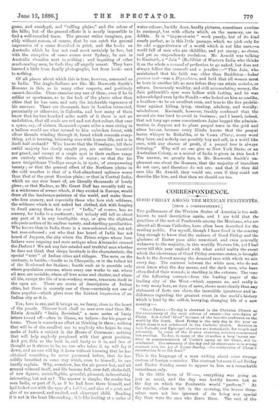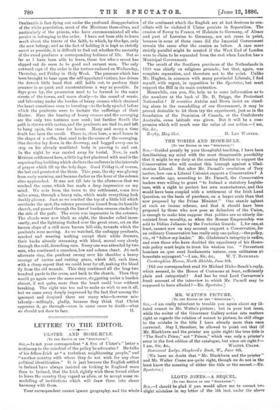CORRESPONDENCE.
GOOD FRIDAY AMONG THE MEXICAN PENITENTES.
[FROM A CORRESPONDENT.]
THE godlessness of the Western States of America is too well- known to need description again, and I am told that the
practices of the sect of Penitent& among the Mexicans, who are
almost all Roman Catholics, have often been described for the reading public. For myself, though I have lived in the country long enough to know that the sadness of Good Friday and the gladness of Easter pass alike unnoticed, and even generally unknown to the majority, in this worldly Western life, yet I had never till this year realised with what awful reality the event which the observance of Good Friday commemorates, is brought back to the devout among the despised race with which we mix every day. The contrast between the white men, who do net even know what the day means, and the dark men, who have often died of their wounds, is startling in the extreme. The tone of the following extract—from the leading paper of the leading city of the West—which appears as, and really is to very many here, an item of news, shows more clearly than any
statement of facts can show, the incredible ignorance and ía-
difference regarding the greatest event in the world's history which is bred by the selfish, hurrying, changing life of a new country :— "Goon FRIDAY.—To-day is observed in the Christian Church as the anniversary of the most solemn of events—the crucifixion of Christ. It is called 'Gc'od' because of the benefits conferred on the world by His death. Good Friday is the only day in the year on which mass is not celebrated in the Catholic church. Services in both Catholic and Episcopal churches are rematkable for length and solemnity. In some of the Denver churches, services commenced last evening. To.day, in many of the churches a long 'agony ser- vice,' in commemoration of Christ's agony on the Cross, will bo celebrated. The solemnity of the day and its observance is in strong contrast with the joy of Easter Sunday—the celebration of Christ's resurrection from the dead."
This is the language of a man writing about some strange custom of foreign countries. The contrast between Good Friday and Easter Sunday seems to appear to him as a remarkable coincidence only.
In the little town of W—, everything was going on just as usual, and the day was hardly known but as the day on which the Penitent6s would "perform." At the ranche, when we left in the morning, the horses them- selves were not less ignorant of its being any special day than were the men who drove them. The sect of the Penitent6s is fast dying out under the profound disapprobation of the white population, most of the Mexicans themselves, and particularly of the priests, who have excommunicated all who persist in belonging to the order. I have not been able to learn much about the tenets of the faith, to which, by-the-bye, only the men belong; and as the fact of holding it is kept as strictly secret as possible, it is difficult to find out whether the austerity of the creed produces a corresponding holiness of life. But so far as I have been able to learn, those few whore secret has slipped out do seem to be good and earnest men. The only outward sign of the order is the torture endured on Wednesday, Thursday, and Friday in Holy Week. The pressure which has been brought to bear upon the self-appointed victims, has driven the devout little band that still holds out, to perform their penance in as quiet and unostentatious a way as possible. In days gone by, the procession used to be formed in the main streets of the towns, and move slowly—to the sound of music. and labouring under the burden of heavy crosses which strained the heart sometimes even to bursting—to the holy symbol before which the penitents were to imitate the sufferings of their Master. Here the bearing of heavy crosses and the scourging are the only two tortures now used ; but farther South the path is strewn with cactus, and the penitents are tied to, and left to hang upon, the cross for hours. Many and many a time death has been the result. There is, close here, a mud house in the shape of a coffin, that used to be the scene of the scourging. One devotee lay down in the doorway, and begged every one to step on his already mutilated body in passing in and out. In the night he was carried away for burial. Now, in each Mexican settlement here, a little log hut plastered with mud is the unpretending building which shelters the sufferers in the intervals of prayer which fill up the holy days. Good Friday is, of course, the last and greatest of the three. This year, the sky was gloomy from early morning, and became darker as the hour of the solemn rites approached. It was not till late in the afternoon that we reached the scene, which has made a deep impression on my mind. We rode from the town to the settlement, some two miles away, through a heavy rain, which made everything look doubly gloomy. Just as we reached the top of a little hill which overlooks the spot, the solemn procession issued from its humble church, and passed through the line of burden-crosses stacked by the side of the path. The scene was impressive in the extreme. The clouds were now black as night, the thunder rolled inces- santly, and the lightning flashed over the great cross, set on the barren slope of a still more barren hill-side, towards which the penitents were moving. As we watched, the unhappy penitents, masked and wearing nothing except their white drawers, their backs already streaming with blood, moved very slowly through the cold, drenching rain. Every one was attended by two men, who continued a ceaseless, low and solemn chant. At each alternate step, the penitent swung over his shoulder a heavy scourge of cactus and cutting grass, which fell, each time, with a sharp report that we could hear far off, making the blood fly from the old wounds. This they continued all the long two hundred yards to the cross, and back to the church. Then they would go again over the same course, staggering under a burden almost, if not quite, more than the heart could bear without breaking. The sight was too sad to make us wish to see it all, but we came away deeply impressed by the fact that among the ignorant and despised there are many who—however mis- takenly—willingly, gladly, because they think that Christ approves it, go through—even in some eases to death—what



































 Previous page
Previous page